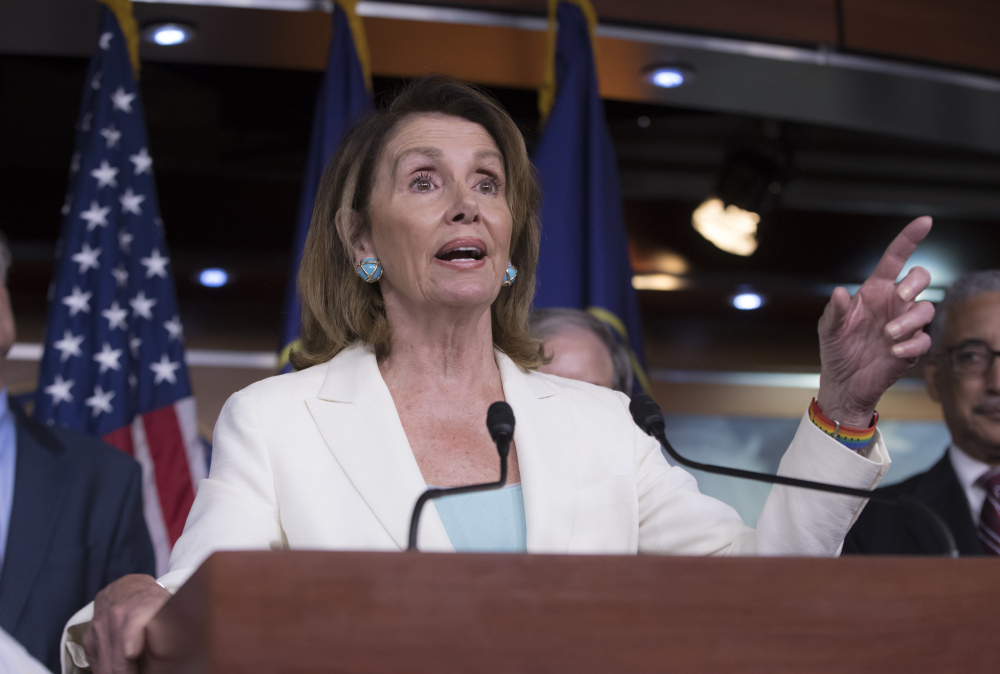WASHINGTON — Senate Majority Leader Mitch McConnell will move next week on a measure to dismantle the Affordable Care Act, but, predicting failure, other senators are already talking about areas of compromise between Republicans and Democrats.
Sen. John Thune, R-South Dakota, chairman of the Senate Republican Conference, said there was a “good chance” that if Republicans prove unsuccessful next week there could be pressure to “pivot to another strategy, which could include shorter term measures where you are dealing with some of the Democrats, assuming they are interested in helping.”
Sen. Ron Johnson, R-Wisconsin, who chairs the Senate Committee on Homeland Security and Governmental Affairs, said he’s talked with the top Democrat on the committee, Sen. Claire McCaskill, D-Missouri, about holding hearings on health care that would look more broadly at the entire system.
In a statement from Arizona, where he is recovering from surgery, Republican Sen. John McCain also endorsed the idea of hearings and negotiations with Democrats.
“Congress must now return to regular order, hold hearings, receive input from members of both parties, and heed the recommendations of our nation’s governors so that we can produce a bill that finally provides Americans with access to quality and affordable health care,” McCain said.
DEMOCRATS WAITING
Democrats signaled they were ready to talk too.
Sen. Tom Carper, D-Deleware, said he has talked several times with McCain and is “hopeful” that after the vote collapses Republicans will begin working with their Democratic colleagues.
Republicans, he said, are “kind of constrained until they have their debate, their vote.”
“If there are not the votes to move forward, then I think you will find plenty of Democrats and Republicans who will work together,” Carper said.
Indeed, a compromise package is not impossible, argued Sabrina Corlette, research professor at Georgetown University’s Center on Health Insurance Reforms.
“My somewhat naive view would be that yes, absolutely, on policy, they can come to bipartisan agreement. That’s the easy part. It’s the politics that are hard,” Corlette said.
An easy fix that both parties might support is a reinsurance program to help insurers with a large number of sicker, high-cost plan members. The Republicans’ House and Senate repeal legislation both contain reinsurance proposals. A bill by Carper and Sen. Tim Kaine, D-Virginia, also would create a reinsurance program.
Timothy Jost, an emeritus law professor at Washington and Lee University, said an effort to step up federal enrollment outreach efforts also might find bipartisan support. But disputes over retaining the Medicaid expansion and strengthening federal subsidies to help purchase marketplace coverage might not be so easy.
“You want to start with small-bore things that everybody can agree on and then go from there,” Jost said.
Another fix that might gain bipartisan support is permanent federal funding of cost-sharing subsidies that help low-income marketplace enrollees with their out-of-pocket costs.
SKEPTICS REMAIN
That’s something they really need to act on right now,” Jost said. “It’s not something to hold hearings on and decide in fall. That needs to happen before (the August) recess, if possible.”
Corlette said Democrats and Republicans might also agree on possible repeal of some ACA taxes, like the so-called Cadillac tax on high-cost health plans and regulatory or tax relief for insurers willing to go into rural counties with no marketplace insurers.
But it wouldn’t be easy.
Sen. Chris Murphy, D-Connecticut, who sits on the Senate health committee, said he’s skeptical of talk that Republicans will work with Democrats.
He said he hoped that Monday night was a turning point after McConnell lost two votes on his bill, but Republicans instead doubled down on their efforts.
Murphy said he’s had “detailed conversations” with Republicans about elements of compromise if the Republican plan fails, “but it’s up to Mitch McConnell to declare when the process has failed and I worry that this is a perpetual process that fails and restarts, fails and restarts.”
And even if Senate Republicans did reach a legislative agreement with Democrats, there’s no guarantee that the more partisan House would buy in.
House Minority Leader Nancy Pelosi said Thursday she wrote to House Speaker Paul Ryan on Tuesday suggesting that the two parties could start to address the cost-sharing reduction payments.
“We’re ready to work in a bipartisan way on this,” she said. “But so far I haven’t gotten a response to my letter.”
Send questions/comments to the editors.



Success. Please wait for the page to reload. If the page does not reload within 5 seconds, please refresh the page.
Enter your email and password to access comments.
Hi, to comment on stories you must . This profile is in addition to your subscription and website login.
Already have a commenting profile? .
Invalid username/password.
Please check your email to confirm and complete your registration.
Only subscribers are eligible to post comments. Please subscribe or login first for digital access. Here’s why.
Use the form below to reset your password. When you've submitted your account email, we will send an email with a reset code.